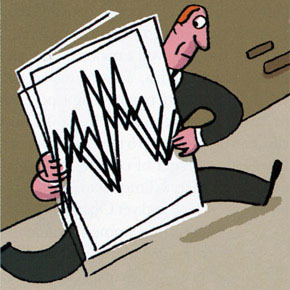John Cassidy's Blog, page 53
May 12, 2014
The Great Hedge-Fund Mystery: Why Do They Make So Much?

This is the time of year when publications that cover the hedge-fund industry do their annual rankings, and people get irate about the vast sums of money that the top hedgies make—in some cases, billions of dollars. At the top of this year’s list, according to a survey from Institutional Investor Alpha, are four familiar names: David Tepper, of Appaloosa Management, who made $3.5 billion; Stephen Cohen, of SAC Capital ($2.4 billion); John Paulson, of Paulson & Co. ($2.3 billion); and James Simons, of Renaissance Technologies ($2.2 billion).
May 9, 2014
A Bluffer’s Guide To the Midterms

O.K., you: put away that article about 2016/Hillary/Benghazi/Monica Lewinsky/Rand Paul/Rick Perry, and listen up. The Congressional midterms are less than six months away, and this stuff is important. Who would you rather have running the Senate? Mitch (“Let’s make Obama a one-term President”) McConnell or Harry (“Sheldon Adelson’s not such a bad guy”) Reid? Even if you’d rather not answer that question, you need to pay attention. At some point in the next few months, somebody is going to ask you this question: Does Mary Landrieu, Kay Hagan, or Michelle Nunn have the better chance of winning? And you’d better have something to say.
Here, then, is a bluffers’ guide to the over-all contest, the key races, the latest polling data, and the big unknowns. (Next week, I’ll follow up with a post on the models behind the forecasts.)
A Bluffers’ Guide To the Midterms

O.K., you: put away that article about 2016/Hillary/Benghazi/Monica Lewinsky/Rand Paul/Rick Perry, and listen up. The Congressional midterms are less than six months away, and this stuff is important. Who would you rather have running the Senate? Mitch (“Let’s make Obama a one-term President”) McConnell or Harry (“Sheldon Adelson’s not such a bad guy”) Reid? Even if you’d rather not answer that question, you need to pay attention. At some point in the next few months, somebody is going to ask you this question: Does Mary Landrieu, Kay Hagan, or Michelle Nunn have the better chance of winning? And you’d better have something to say.
Here, then, is a bluffers’ guide to the over-all contest, the key races, the latest polling data, and the big unknowns. (Next week, I’ll follow up with a post on the models behind the forecasts.)
May 7, 2014
Obama’s Foreign-Policy “Failures”: A Word for the Defense

President Obama has lost the foreign-policy commentariat—and I’m not just talking about the usual conservative bashers. In today’s Washington Post, David Ignatius writes, “Under Obama, the United States has suffered some real reputational damage. I say that as someone who sympathizes with many of Obama’s foreign policy goals.”
...read moreMay 6, 2014
Bill de Blasio’s Middle Ground

During his first months in office, Mayor Bill de Blasio was snowed upon from the heavens, sandbagged by the governor and his charter-school allies, and kicked by supporters of Central Park’s carriage horses. Now he is getting down to work. Last week, he reached a pay deal with the teachers’ union that he hopes will serve as a model for agreements with other city workers, and on Monday he released his housing plan, which, he said, would create or preserve two hundred thousand affordable units over the next ten years. Meanwhile, his administration is working on greatly increasing the number of full-day pre-kindergarten slots that the city provides, using money recently obtained from Albany.
May 5, 2014
Gary Becker and the Economics Revolution That Wasn’t

In the wake of the 2008 financial crisis and the Great Recession, there was a lot of talk about the failure of economics and the need for a new paradigm. That was the context in which Paul Krugman wrote what became a famous essay on saltwater versus freshwater economics (“How Did Economists Get It So Wrong?”); the filmmaker Charles Ferguson, in his documentary “Inside Job,” unmasked several prominent economists as highly paid Wall Street consultants; and George Soros set up the Institute for New Economic Thinking, which was intended to finance research that challenged the prevailing orthodoxy.
Gary Becker and the Economics Revolution That Wasn't

In the wake of the 2008 financial crisis and the Great Recession, there was a lot of talk about the failure of economics and the need for a new paradigm. That was the context in which Paul Krugman wrote what became a famous essay on saltwater versus freshwater economics (“How Did Economists Get It So Wrong?”); the filmmaker Charles Ferguson, in his documentary “Inside Job,” unmasked several prominent economists as highly paid Wall Street consultants; and George Soros set up the Institute for New Economic Thinking, which was intended to finance research that challenged the prevailing orthodoxy.
Postscript: Gary Becker (1930-2014)

Gary Becker, who died on Saturday at the age of eighty-three, was one of the most renowned economists of the post-war era. Together with Milton Friedman, he helped make the University of Chicago the world leader in free-market economics. While Friedman was more famous to the general public, Becker
was equally influential, or perhaps even more influential, among professional economists. (Each won a Nobel Memorial Prize in Economics—Friedman in 1976, Becker in 1992.) In a career covering more than fifty years, Becker applied economic reasoning to a whole range of subjects, including education, family structure, race relations, and reproduction. His insistence that rational cost-benefit analysis could be applied to issues such as marriage and reproduction offended some non-economists, but was widely copied, as was his insistence that markets were the best way to allocate things like places in schools, immigration visas, and even human organs.
May 2, 2014
A Good, But Not Great, Jobs Report

It looks like spring has finally arrived for the U.S. economy, but it’s not time to crack out the bubbly just yet.
The headline figure in Friday’s employment report—288,000 jobs added in April—was encouraging, as were some other details in the report. After the latest revisions, job growth in the past three months averages to about 240,000, a marked improvement over last year.
Reagan and Keynes: The Love That Dare Not Speak Its Name

Toward the end of 1981, nearly a year after Ronald Reagan entered the White House, Sir Nicholas Henderson, the United Kingdom’s ambassador to Washington, wrote an annual review, including his observations of the President, and sent it to the Foreign Office, in London. Henderson, a British mandarin—Stowe, Oxford, G.C.M.G., K.C.V.O.—wasn’t exactly impressed with the former actor from Eureka, Illinois. “He has clear-cut opinions, not to say prejudices, as was apparent to me when he told me à propos Keynes that it must not be forgotten that he was a homosexual,” Henderson wrote.
Henderson’s account, which came to light in some newly released diplomatic papers that The Daily Beast spotted, is interesting in a number of respects. For one thing, it suggests that Reagan had somewhere picked up on a homophobic critique of Keynes that had been circulating in conservative circles for decades. According to Robert Skidelsky, the author of a monumental biography of Keynes, it dates back at least to Keynes’s death, in 1946, when Joseph Schumpeter, the Austrian economist, who moved to Harvard, wrote in an obituary, “He was childless and his philosophy of life was essentially a short-run philosophy.”
...John Cassidy's Blog
- John Cassidy's profile
- 56 followers



